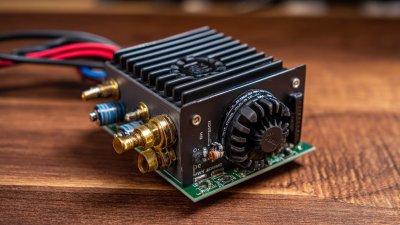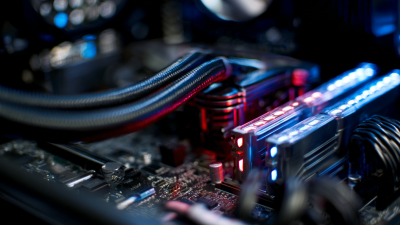Why DC Supply is Essential for Modern Electronic Devices and Applications
In today's rapidly evolving technological landscape, the importance of DC supply in modern electronic devices and applications has never been greater. According to a report by MarketsandMarkets, the global power supply market is projected to reach USD 38.3 billion by 2025, with DC-DC converters holding a significant share due to their efficiency and versatility in powering a wide range of electronic systems—from consumer electronics to industrial automation. The demand for renewable energy sources further amplifies the need for efficient DC supply systems that can seamlessly integrate with solar panels and battery storage solutions. As devices become more reliant on direct current for sustainable operation, understanding the pivotal role of DC supply in enhancing performance and energy efficiency becomes essential for innovators and engineers alike. This highlights the critical relationship between reliable DC power sources and the advancement of modern electronic applications, making it a focal point for ongoing research and development initiatives.

The Importance of DC Supply in Today's Electronic Landscape
The importance of DC supply in today's electronic landscape cannot be overstated. With the rapid advancement of technology, the majority of modern electronic devices, from smartphones to laptops, are designed to operate on direct current (DC). This is primarily due to the stability and versatility DC power provides. Unlike alternating current (AC), DC supply offers a consistent voltage level, which is crucial for sensitive electronic components that require precise power levels to function optimally.
Moreover, as renewable energy sources like solar panels become more prevalent, the role of DC supply is increasingly significant. These energy systems convert sunlight into DC electricity, which can be efficiently stored in batteries for later use. This not only contributes to energy sustainability but also supports the growing demand for portable and battery-operated devices. As we continue to integrate technology into our daily lives, the reliability of DC supply systems will remain a cornerstone in supporting innovation and efficiency in modern electronics.

Key Applications of DC Power in Modern Technology
The applications of DC power are increasingly integral to modern technology, particularly in the fields of data centers and electric vehicles. As the demand for AI technologies surges, the infrastructure supporting these advancements must evolve as well. Notably, the shift to 800 VDC architectures in data centers is a response to the exponential growth in power demands for AI workloads. According to industry reports, these new standards are expected to significantly enhance efficiency, allowing data centers to manage larger loads with reduced energy losses, ultimately paving the way for greener, more sustainable operations.
In the realm of electric vehicles, ultrafast DC charging solutions are becoming essential. Recent collaborations have introduced advanced charging architectures that cater specifically to public and fleet charging needs. A market analysis indicates that the global DC fast charging market is poised to grow at a compound annual growth rate (CAGR) of over 30% in the coming years. This growth not only supports the escalating adoption of electric vehicles but also underscores the importance of reliable and efficient DC power sources, ensuring that infrastructure keeps pace with technological advancement. Furthermore, innovative medical devices leveraging DC voltage cold plasma technology exemplify the versatility of DC power applications, promoting safer sterilization methods in healthcare settings.
Advantages of Using DC Supply Over AC Power Sources
When it comes to powering modern electronic devices, the choice between DC (Direct Current) and AC (Alternating Current) is crucial. One primary advantage of using DC supply is its efficiency in delivering power to low-voltage devices. According to a recent report by the International Energy Agency (IEA), approximately 50% of the energy consumed in the industrial sector is used for electrical devices operating at low voltages, which can be more reliably supported by DC power sources. This makes DC supply not only a more efficient choice but also a more environmentally friendly option, as it minimizes energy wastage.
Additionally, DC supply systems are more adaptable for renewable energy applications, such as solar panels and wind turbines, which generate electricity in DC form. The Global Solar Council estimates that solar power could provide up to 35% of the world’s energy by 2050, highlighting the growing importance of DC supply systems. With the increasing integration of DC-powered devices in homes and industries, the relevance of DC supply over traditional AC power continues to rise.
Tip: When designing electronic circuits, consider using DC power sources for devices with sensitive electronics or requiring reliable operation, as this can enhance performance and extend the lifespan of the components. Another tip is to explore DC microgrids for your facility, as they can optimize energy distribution and reduce energy losses significantly.
Understanding the Role of DC in Renewable Energy Systems
The role of Direct Current (DC) in renewable energy systems cannot be overstated. As the world increasingly shifts towards sustainable energy sources, the reliance on DC becomes essential in effectively harnessing, converting, and storing energy from sources like solar, wind, and hydropower. DC provides a stable and efficient way to transfer energy from these renewable sources to various applications, minimizing power loss and ensuring optimal performance.
Tips for integrating DC in renewable systems include ensuring proper inverter settings for solar panels, which convert DC generated by the panels into AC for home use. Additionally, incorporating battery storage systems allows for energy collected during peak generation times to be used later, enhancing stability and reliability. This synergy not only promotes energy efficiency but also empowers users to maximize their renewable resources.
Moreover, the growing adoption of DC microgrids allows for localized energy management, significantly increasing the ability to utilize renewable energy sources more effectively. By embracing DC infrastructure alongside renewable technologies, we can build greener, more resilient energy systems that effectively meet modern demands.

Future Trends in DC Power Supply for Electronic Innovations
The landscape of electronic devices is rapidly evolving, and with it, the demand for efficient and reliable DC power supplies is intensifying. Future trends indicate that advancements in technology will significantly shape how DC power supplies are integrated into electronic innovations. For instance, the rise of renewable energy sources is prompting the development of smart DC power supplies that not only convert energy efficiently but also adapt to varying input conditions. These smart systems will enable better management of power distribution in applications like electric vehicles and smart grids, promoting sustainability.
Moreover, the increasing prevalence of portable electronics and IoT devices underscores the need for compact, lightweight, and highly efficient DC power solutions. Innovations such as advanced battery management systems and energy harvesting technologies are set to play a pivotal role in optimizing power supply for these devices. The advent of ultra-low-power components and circuits will further enhance the performance of DC supplies, making them integral to the next generation of wearables and smart home devices, all while minimizing energy consumption and maximizing functionality. As research continues to push the boundaries of DC technology, we can expect to see a transformative impact on how electronic innovations are powered in the years to come.
Related Posts
-

Addressing Common Issues with DC Supply Systems: A Comprehensive Guide
-

10 Digital Tips for Optimizing Efficiency in DC DC Power Supply Systems
-

Understanding the Differences in Power Supply Unit Technologies
-

How to Choose the Right DC to AC Converter for Your Power Needs
-

How to Choose the Right PSU for Your Computer to Maximize Performance and Efficiency
-

Innovative Applications of DC to DC Converters in Modern Electronics
At Premium PSU, we are specialists in designing and manufacturing power conversion systems for the industrial market. Our product range includes high reliability power supplies from 50W to 72kW.
PREMIUM PSU
C/ Dolors Aleu, 19-21, 2nd Floor
08908 – Hospitalet de Llobregat
Barcelona-SPAIN
t.+34 93 223 26 85


